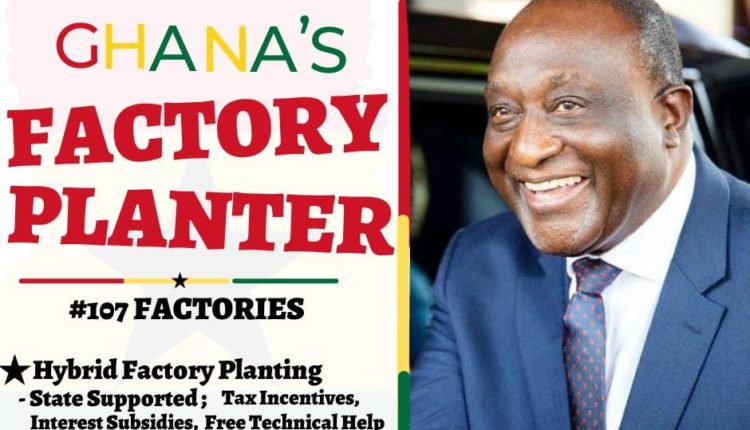Job creation to satisfy Ghanaians is as straight forward as it gets – Plant more factories and produce more Made-In-Ghana products.
This has been one of the main components of Ghana’s industrialization agenda.
Alanconomics, is the art of planting factories, that guarantees sustainable job and wealth (cash) creation.
This formula of Alanconomics can be captured as; Planting Factories = More Jobs + More Cash
Job creation and wealth creation (Cash) are the fruits of an industrialized economy.
What’s the use of macroeconomic indicators when there are no practical jobs and wealth to show for the citizens of a country?
Planting of factories as exemplified by Alan Kyerematen(107 factories), is the main way to break the back of rising unemployment and structural economic transformation.
Massive employment opportunities have arisen out of the planting of 107 factories under the 1D1F concept.
Alan Kyerematen’s factory planting seeks to produce Made-In-Ghana products for local consumption and also for exports especially for the continental market through AfCFTA.
In preparation for more factory planting, Alan Kyerematen has applied “smart economics” to build a sustainable approach to maintaining and growing these factories.
HYBRID FACTORY PLANTING (STATE & PRIVATE SECTOR MIX)
The smart economics of planting factories to create more jobs (directly and indirectly), has been through a hybrid of state and private entities/promoters.
This hybrid system of planting factories consists of lessons learnt from the state approach to planting factories like it was under Osagyefo Kwame Nkrumah in 1960 and also the NDC government with Komenda factory where it was a full state approach.
The strategy to the planting of these 107 factories is for the state to offer fiscal support like; Tax incentives, Corporate Tax holidays, Interest Subsidies, Free Technical assistance etc.
Also non-fiscal support like the Extension of Infrastructure (Water, Electricity & Roads).
This doesn’t make government or the state the owners of these factories that are planted.
Looking into the future, the area where massive jobs will flow to the Ghanaians especially the youth will be through industrialization.
These jobs will flow through the huge demand for Made-In-Africa products, as the AfCFTA agreement will be make products produced on the continent cheaper than those imported from China, Europe and the like.
More global companies will be ready to set up factories in Ghana and create jobs for Ghanaians.
In the automotive sector; VW, Suzuki, Toyota, Nissan, Sinotruck have all set the pace.
Later in this year, Hyundai, KIA, Renault and Peugeot will also setup factories in Ghana.
CONCLUSION:
Therefore, the next leader of Ghana should be someone with a demonstrable track record to make creative decisions on industrial job policies that will make Ghana a step ahead of other African countries.
Ghana under such industrial-economic leadership will be in a greater position to reap the rewards of massive jobs and cash as a result of the global companies that will set up base in Ghana.
The investment of choice for the future is the planting of factories here to create the jobs that Ghanaians need.
Alan Kyerematen is showing the way and has already achieved with AfCFTA, as a pioneering pillar in it’s establishment.
This practical and competent economist deserves to be the next leader of Ghana to actualize this vision of an industrialized Ghana that plants factories and creates massive jobs.
Source By: Terry Afram-Kumi


Comments are closed.